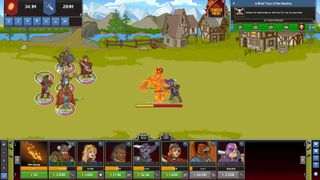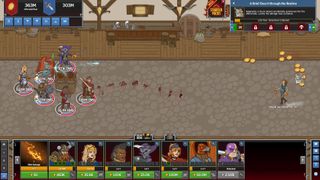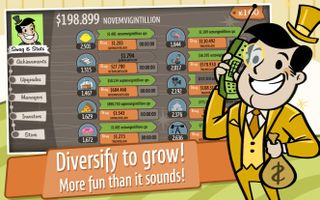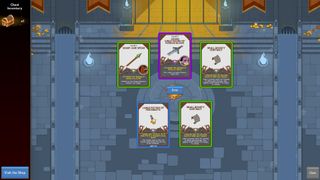Idle Champions of the Forgotten Realms is Progress Quest by another name
Dungeons & Dragons in clicker form.

Remember Progress Quest? In 2002, Progress Quest was satire: an RPG that played itself. You rolled up a character, chose from a list of silly options (I'm a Land Squid Voodoo Princess myself), and then you sat back. Underneath your character sheet a progress bar filled up, saying that you were "Executing a sick Troll" or perhaps at market to "sell two orc snouts". Eventually, the numbers on your character sheet went up. That's it. That was the entire game.
When EverQuest was still consuming players' lives, Progress Quest seemed pretty funny. We had joke arguments on forums about whether the Dung Elf was overpowered or there was good synergy in playing a Demi-Canadian who was also a Birdrider. Of course, none of that stuff mattered. Progress Quest reduced RPGs to an activity as rote as defragging your hard drive, and suggested the only thing that mattered was that somewhere a number was going up.
I didn't expect it to come true.

Idle Champions of the Forgotten Realms is made by indie studio Codename Entertainment, who previously developed Crusaders of the Lost Idols. Idle Champions is essentially a reskin of their previous game, with characters and places from the Forgotten Realms D&D setting draped over it.
Those champions are arranged on screen left as monsters approach from the right. The heroes attack at intervals and huge damage numbers fly out. You can click to cause a little damage yourself, but soon opponents have hit points in the millions and your clicks become redundant. You can spend the gold enemies drop on leveling up that click, but it's better spent unlocking more champions and then leveling them up so they gain cooldown attacks and damage bonuses that affect other champions in the formation.
The gamiest part of Idle Champions is managing that formation. There's a DPS number at the top of the screen and rearranging your heroes can boost it drastically. Eventually the dwarf will be able to double the damage of anyone in the same column, while the cleric can boost the dwarf's attacks if she's next to him, and the bard unlocks the ability to buff anyone in front of her. It's a little puzzle box.


Progress Quest isn't the only idle game to parody the way videogame compulsion loops work. Cow Clicker was a send-up of Farmville, Cookie Clicker made fun of Candy Box, and AdVenture Capitalist was a parody of the entire genre and also of capitalism itself. Each time the compulsion is strong enough to suck players in as effectively as whatever is being satirized.
Even with that, and other tangential stuff like clicking on archers to interrupt their shots or clicking on background elements like birds to squeeze a few more gold coins out, Idle Champions is a game designed to play itself. It even carries on in your absence when you shut it down, welcoming you back with a pile of gold the heroes earned while you were away.
The biggest gaming news, reviews and hardware deals
Keep up to date with the most important stories and the best deals, as picked by the PC Gamer team.
As someone who spent 30 hours just getting off the first island in Divinity: Original Sin 2, I can see the appeal. When I return to that game I have to remember what I was up to, and then if I get murdered by Voidwoken or lose my pet friend I have to reload a save and replay some stuff. That can feel like wasted time, but in idle games I'm always moving forward. The thing is, in any sense that matters, idle games absolutely are a waste of time.

I'll never get a story out of Idle Champions about defeating a boss by teleporting it on top of an explosive barrel, never talk to the ghost of a bull convinced he can see the future. Even when there are slivers of story between levels they're so slight they dissolve on your tongue.
There's a button in Idle Champions to let heroes autocomplete quest stages while you're absent, moving on to the next "kill 15 Gnolls" or "collect 25 rabbit carcasses" without me even needing to click on the arrow. Back in the day, Progress Quest claimed that "There is no need to interact with Progress Quest at all; it will make progress with you or without you." At the time it was a joke. Now it's a feature.

Jody's first computer was a Commodore 64, so he remembers having to use a code wheel to play Pool of Radiance. A former music journalist who interviewed everyone from Giorgio Moroder to Trent Reznor, Jody also co-hosted Australia's first radio show about videogames, Zed Games. He's written for Rock Paper Shotgun, The Big Issue, GamesRadar, Zam, Glixel, Five Out of Ten Magazine, and Playboy.com, whose cheques with the bunny logo made for fun conversations at the bank. Jody's first article for PC Gamer was about the audio of Alien Isolation, published in 2015, and since then he's written about why Silent Hill belongs on PC, why Recettear: An Item Shop's Tale is the best fantasy shopkeeper tycoon game, and how weird Lost Ark can get. Jody edited PC Gamer Indie from 2017 to 2018, and he eventually lived up to his promise to play every Warhammer videogame.
Most Popular





